This Week in Labor History
February 12

Abolitionist Frederick Douglass born into slavery near Easton, Md. – 1818
John L. Lewis, president of United Mine Workers of America and founding president of the CIO, born near Lucas, Iowa – 1880
February 13
A national eight-month strike by the Sons of Vulcan, a union of iron forgers, ends in victory when employers agreed to a wage scale based on the price of iron bars—the first time employers recognized the union, the first union contract in the iron and steel industry, and what may be the first union contract of any kind in the United States – 1865
Some 12,000 Hollywood writers returned to work today following a largely successful three-month strike against television and motion picture studios. They won compensation for their TV and movie work that gets streamed on the Internet – 2008
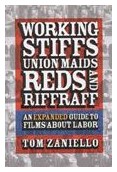 (Working Stiffs, Union Maids, Reds, and Riffraff is an encyclopedic guide to 350 labor films from around the world, ranging from those you’ve heard of—Salt of the Earth, The Grapes of Wrath, Roger & Me—to those you’ve never heard of but will fall in love with once you see them. Fiction and nonfiction, the films are about unions, labor history, working-class life, political movements, and the struggle between labor and capital.)
(Working Stiffs, Union Maids, Reds, and Riffraff is an encyclopedic guide to 350 labor films from around the world, ranging from those you’ve heard of—Salt of the Earth, The Grapes of Wrath, Roger & Me—to those you’ve never heard of but will fall in love with once you see them. Fiction and nonfiction, the films are about unions, labor history, working-class life, political movements, and the struggle between labor and capital.)
February 14
Western Federation of Miners strike for 8-hour day – 1903
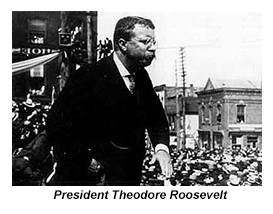 President Theodore Roosevelt creates the Department of Commerce and Labor. It was divided into two separate government departments ten years later – 1903
President Theodore Roosevelt creates the Department of Commerce and Labor. It was divided into two separate government departments ten years later – 1903
Jimmy Hoffa born in Brazil, Ind., son of a coal miner. Disappeared July 30, 1975, declared dead seven years later – 1913
Striking workers at Detroit’s newspapers, out since the previous July, offer to return to work. The offer is accepted five days later but the newspapers vow to retain some 1,200 scabs. A court ruling the following year ordered as many as 1,100 former strikers reinstated – 1996
February 15
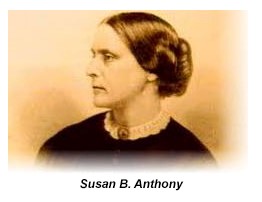 Susan B. Anthony, suffragist, abolitionist, labor activist, born in Adams, Mass. “Join the union, girls, and together say: Equal Pay for Equal Work!” – 1820
Susan B. Anthony, suffragist, abolitionist, labor activist, born in Adams, Mass. “Join the union, girls, and together say: Equal Pay for Equal Work!” – 1820
U.S. legislators pass the Civil Works Emergency Relief Act, providing funds for the Federal Emergency Relief Administration, which funneled money to states plagued by Depression-era poverty and unemployment, and oversaw the subsequent distribution and relief efforts – 1934
The Congress of Industrial Organizations (CIO) expels the Mine, Mill & Smelter Workers; the Food, Tobacco & Agricultural Workers; and the United Office & Professional Workers for “Communist tendencies.” Other unions expelled for the same reason (dates uncertain): Fur and Leather Workers, the Farm Equipment Union, the Int’l Longshoremen’s Union, the United Electrical, Radio and Machine Workers – 1950
February 16

Leonora O’Reilly was born in New York. The daughter of Irish immigrants, she began working in a factory at 11, joined the Knights of Labor at 16, and was a volunteer investigator of the Triangle Shirtwaist Factory Fire of 1911. She was a founding member of the Women’s Trade Union League – 1870
Diamond Mine disaster in Braidwood, Ill. The coal mine was on a marshy tract of land with no natural drainage. Snow melted and forced a collapse on the east side of the mine, killing 74 – 1883
Beginning of a 17-week general strike of 12,000 New York furriers, in which Jewish workers formed a coalition with Greek and African American workers and became the first union to win a 5-day, 40-hour week – 1926
Rubber Workers begin sit-down strike at Goodyear Tire and Rubber Co. – 1936
American Wire Weavers Protective Association merges with United Papermakers & Paperworkers – 1959
All public schools in Milwaukee and Madison, Wisc., are closed as teachers call in sick to protest Gov. Scott Walker’s plans to gut their collective bargaining rights – 2011
February 17
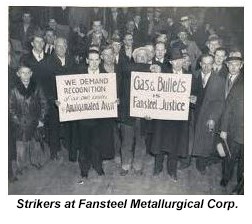 Sixty-three sit-down strikers, demanding recognition of their union, are tear-gassed and driven from two Fansteel Metallurgical Corp. plants in Chicago. Two years later the U.S. Supreme Court declared sit-down strikes illegal. The tactic had been a major industrial union organizing tool – 1937
Sixty-three sit-down strikers, demanding recognition of their union, are tear-gassed and driven from two Fansteel Metallurgical Corp. plants in Chicago. Two years later the U.S. Supreme Court declared sit-down strikes illegal. The tactic had been a major industrial union organizing tool – 1937
Two locals of the Hotel Employees and Restaurant Employees Int’l Union (now UNITE HERE) at Yale University in New Haven, Conn., strike in sympathy with 1,300 graduate student teaching assistants who are demanding the right to negotiate with the university – 1992
February 18
One of the first American labor newspapers, The Man, is published in New York City. It cost 1¢ and, according to The History of American Journalism, “died an early death.” Another labor paper, N.Y. Daily Sentinel, had been launched four years earlier – 1834
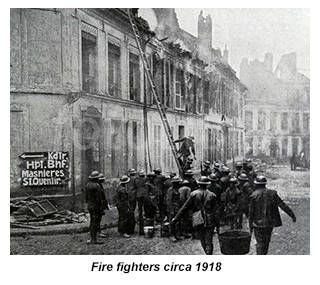 Faced with 84-hour workweeks, 24-hour shifts and pay of 29¢ an hour, fire fighters form The Int’l Association of Fire Fighters. Some individual locals had affiliated with the AFL beginning in 1903 – 1918
Faced with 84-hour workweeks, 24-hour shifts and pay of 29¢ an hour, fire fighters form The Int’l Association of Fire Fighters. Some individual locals had affiliated with the AFL beginning in 1903 – 1918
—Compiled and edited by David Prosten
